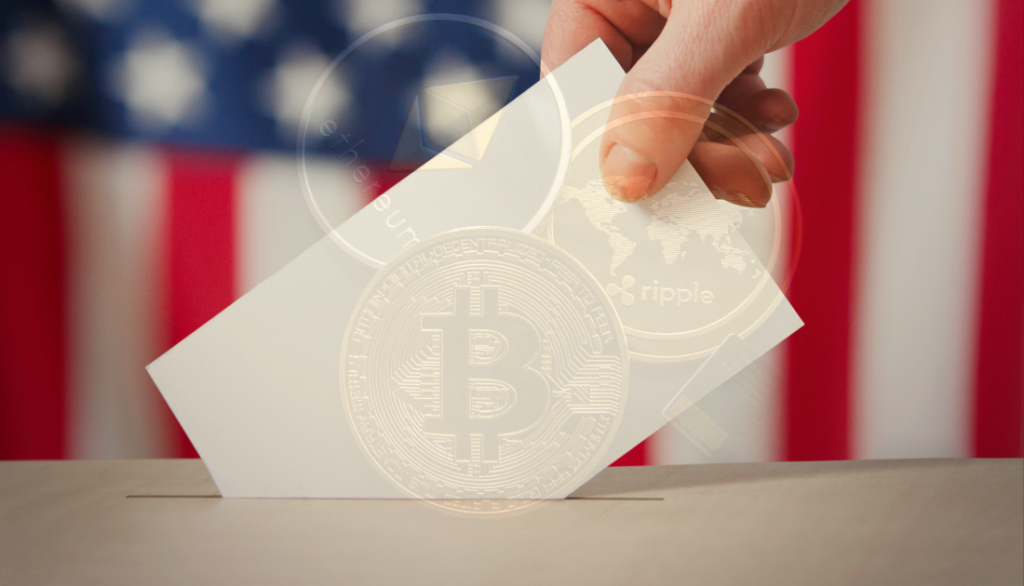As the U.S. presidential election approaches, crypto markets are on edge, with the race between Donald Trump and Kamala Harris poised to impact cryptocurrency valuations.
Historically, political shifts, policy changes, and economic strategies have influenced the global crypto landscape, and this election is no exception.
Note for Indian Readers – The cryptocurrency landscape is continually evolving, and regulations regarding digital assets in India may vary. It is advisable to stay informed about the latest guidelines from the Reserve Bank of India (RBI) and the Securities and Exchange Board of India (SEBI) before making investment decisions.
Election Week Market Dynamics
On Tuesday, the cryptocurrency market showed mixed trends as traders reacted to election-related uncertainty.
Major tokens like Bitcoin and Ethereum faced selling pressure, with Bitcoin trading at $68,710 and Ethereum at $2,431 as of 10:05 AM GMT.
Meanwhile, other digital assets like Dogecoin experienced gains of up to 10% highlighting diverse investor sentiment across the market.
Over the past 24 hours, the global cryptocurrency market cap rose by 0.36% to approximately $2.26 trillion, demonstrating resilience despite cautious trading sentiment ahead of both the U.S. election and an upcoming Federal Reserve policy meeting.
Volatility remains high, and the combined effects of these key events are keeping market participants watchful.
Historically, Bitcoin has occasionally shown gains post-election, but outcomes vary and depend on a broader range of economic factors. The current market dips may be temporary, though caution is evident as investors await clearer political and economic signals.
Trump vs. Harris on Crypto
Donald Trump’s campaign has highlighted intentions to enhance the U.S. position in the crypto sector, with an emphasis on market leadership and streamlined regulation.
Speaking at a Bitcoin event in Nashville this July, Trump discussed ideas aimed at positioning the U.S. at the forefront of digital asset innovation, including potentially creating a Bitcoin and crypto advisory council to help clarify regulations.
His comments also suggested a review of regulatory bodies like the SEC, focusing on ways to address perceived regulatory hurdles.
The recent launch of a cryptocurrency exchange by Trump’s family, World Liberty Financial (WLFI), has added visibility to his pro-crypto outlook.
Kamala Harris has expressed a more cautious yet supportive approach toward blockchain and crypto policy. During her campaign, she has highlighted the importance of innovation while stressing consumer protection.
In a recent address, Harris emphasized the need for frameworks that encourage tech advancements, including digital assets, without compromising investor security.
Her proposed policies include establishing guidelines for regulating digital assets to maintain a balanced environment for innovation and protection.
While both candidates have acknowledged the role of digital assets, Trump’s more detailed proposals have stirred discussions within the crypto community.
According to data from Santiment, his proactive approach has attracted attention, whereas Harris’ policy stance places emphasis on regulatory oversight and consumer safeguards.
Historical Reactions to U.S. Elections
Historically, the cryptocurrency market has responded with heightened volatility around U.S. presidential elections. Observing past election cycles can offer valuable insights into how the market may react in the current environment.
- 2016 Election – Following Donald Trump’s unexpected win, Bitcoin experienced a brief 5.5% dip within five days, as investors anticipated more clarity on his economic policies. However, prices soon stabilized, and Bitcoin continued its broader upward trend.
- 2020 Election – In contrast, Joe Biden’s election triggered a rally, with Bitcoin rising by over 22% in the 11 days following his win. This growth was likely influenced by pandemic-related economic measures, such as stimulus efforts and interest rate reductions, which boosted liquidity and fueled market optimism.
While this is a limited data set, these examples suggest that crypto markets can react strongly to election outcomes, often influenced by the anticipated regulatory, technological, and economic directions of the incoming administration.
Factors Influencing Crypto Volatility During Elections
For cryptocurrency traders, understanding the dynamics that elections can introduce is crucial. Look into some of the primary factors that can drive volatility during election periods.
- Regulatory Stance – The crypto market often reacts to shifts in regulatory policy. Statements from either candidate that imply potential changes in regulation can lead to significant price movements.
- Investor Sentiment – Traders’ confidence can fluctuate based on election-related developments. Even subtle statements on digital assets or blockchain technology may sway sentiment and cause rapid market shifts.
- Economic Policies – The election result will shape U.S. economic strategies, including those affecting interest rates and financial innovation. Policies influencing liquidity and economic stimulus can have pronounced effects on crypto valuations, as seen during the pandemic relief period.
What Traders Should Watch
With Trump and Harris presenting differing perspectives on cryptocurrency policy, traders will need to watch for key post-election announcements that could affect crypto valuations.
- Trump’s Crypto Initiatives – Should Trump assume office, his proposed pro-crypto measures, such as forming an advisory council and establishing a national Bitcoin reserve, may bolster market sentiment. Additionally, his discussions around potential changes in the SEC’s leadership could signal shifts in regulatory approaches, potentially impacting the broader crypto landscape.
- Harris’ Regulatory Balance – If Harris secures the presidency, her emphasis on balanced regulation could support gradual crypto adoption within a more structured framework. By prioritizing consumer protection and market integrity, her administration might create a stable environment, potentially broadening crypto’s appeal among cautious investors.
Regardless of the election’s outcome, the cryptocurrency market is likely to remain volatile, providing traders with opportunities to adapt their strategies as new trends emerge.
The Bigger Picture
While cryptocurrency markets operate on a global scale, the United States plays a pivotal role due to its significant economic influence.
Historical trends indicate that the market tends to react sharply to political uncertainty, and this upcoming election is anticipated to generate a similar impact.
The political sentiment surrounding cryptocurrencies, along with specific proposals from both candidates, will be key factors in shaping price movements and trading volumes.
The crypto market’s response to the election will likely mirror broader investor attitudes toward risk and regulatory changes.
Whether the election results lead to increased crypto adoption or a more cautious regulatory environment, the sector’s sensitivity to U.S. political dynamics will remain a crucial focal point for investors around the world.
Disclaimer – The information provided in this article is for informational purposes only and should not be construed as financial, investment, or trading advice. MarketScope Daily is not a registered investment advisor, and the content presented here does not constitute an offer or solicitation to buy or sell any cryptocurrencies or financial instruments. The views and opinions expressed are solely those of the authors and do not necessarily reflect the official policy or position of MarketScope Daily. Cryptocurrency investments involve significant risks, and past performance is not indicative of future results. Readers are encouraged to conduct their own research and consult with a qualified financial advisor before making any investment decisions.


